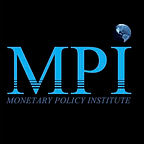Remembering Paul Davidson
Louis-Philippe Rochon
Full Professor, Laurentian University
Editor-in-Chief, Review of Political Economy
Founder, Review of Keynesian Economics
Monetary Policy Institute Blog #141
“Regardless of whether we agreed with him or not (and there was a lot to disagree with), we owe him all a collective debt of gratitude”.
I can’t quite remember the first time I met Paul. It was sometime in the 1980s, that much I know. Certainly, I was exposed to his views early on in Marc Lavoie’s course at the University of Ottawa on post-Keynesian economics, in 1986. There was something magical reading about Keynes and uncertainty. At that time, I was much in agreement with much of what Paul was writing.
Over the years, however, I came to disagree with his views and interpretation of Keynes, post- Keynesian economics, and on money and monetary policy, as I drifted closer to Kalecki. I hardened my criticism of Keynes, and I thought Paul was not sufficiently critical of Keynes, something we often discussed, and that he took a too narrow view of who is a post-Keynesian. After all, in creating the Journal of Post Keynesian Economics, he chose to distance himself from the economics of Cambridge by omitting the hyphen! In fact, he questioned whether Joan Robinson was a post-Keynesian or a ‘foremother of post Keynesianism’ (despite inviting her to write an article in the first issue of the journal).
And there was this 2003 debate in the Journal of Post Keynesian Economics between himself, Marc Lavoie and John King over John’s 2002 book, A History of Post Keynesian Economics since 1936. He objected to broadening the definition of post-Keynesian economics, as this would ultimately lead to the inability to have a “theoretical coherent analysis”. He specifically rejected the inclusion of Sraffians and Kaleckians under the umbrella term of post-Keynesian economics. According to Paul, “To grant Sraffians and Kaleckians citizenship in the Post Keynesian school therefore assures that some ‘post Keynesians’ will rely on some analytical model that is logically inconsistent (and hence incoherent) with Keynes’s General Theory.”
That debate for me was very revealing, not only because I sided with Marc Lavoie’s position on the topic, but because I naturally always adopted a very broad definition of post-Keynesian economics. I never really understood the acrimonious debates and accusations that ultimately doomed the Trieste School. I was a student of the New School after all, and my friends there were Kaleckians, Marxists and Sraffians. I always saw the similarities between us above all else. There were and are important differences, but these are part of the debate over the details, in my opinion. On large issues, we agree substantially. Today, young Sraffians and Kaleckians work side by side with many so-called post-Keynesians (myself included), and don’t necessarily object to being included in that broad tent.
So, overtime, I distanced myself from Paul’s narrow views on post-Keynesian economics, but always remained loyal to him for what he accomplished for the institution of post-Keynesian economics. In creating the JPKE, he gave post-Keynesians a platform and a voice of our own. There were other journals of course, certainly post-Keynesian friendly, but this was ‘our’ journal. And in many ways, the institution of post-Keynesian economics was born, and the journal will be celebrating its 50 th anniversary soon.
In the introduction to the journal, in 1978, Paul speaks of “the need for a general scholarly journal receptive to innovative theoretical work that can shed fresh light on contemporary economic problems” — something neoclassical economics could no longer do. In that light, Paul was a fierce critic of the mainstream, as we have all become. His views on the subject are still relevant five decades later.
I was lucky to have been guest editor of eight symposiums and special issues of the JPKE, between 2004 and 2013. Paul very much liked those issues, and they gave me the opportunity to hone my editor skills. In fact, Paul was mentoring me to take over the journal and become its next editor, although that did not quite happen. But that is how I ended up creating the Review of Keynesian Economics. As the old saying goes, “when one door closes, another one opens.”
In the end, Paul’s contribution to post-Keynesian economics, both in terms of theory, ideas, and institution, is nothing short of immense. He leaves a vast and lasting legacy. And regardless of whether we agreed with him or not (and there was a lot to disagree with), we owe him all a collective debt of gratitude.
